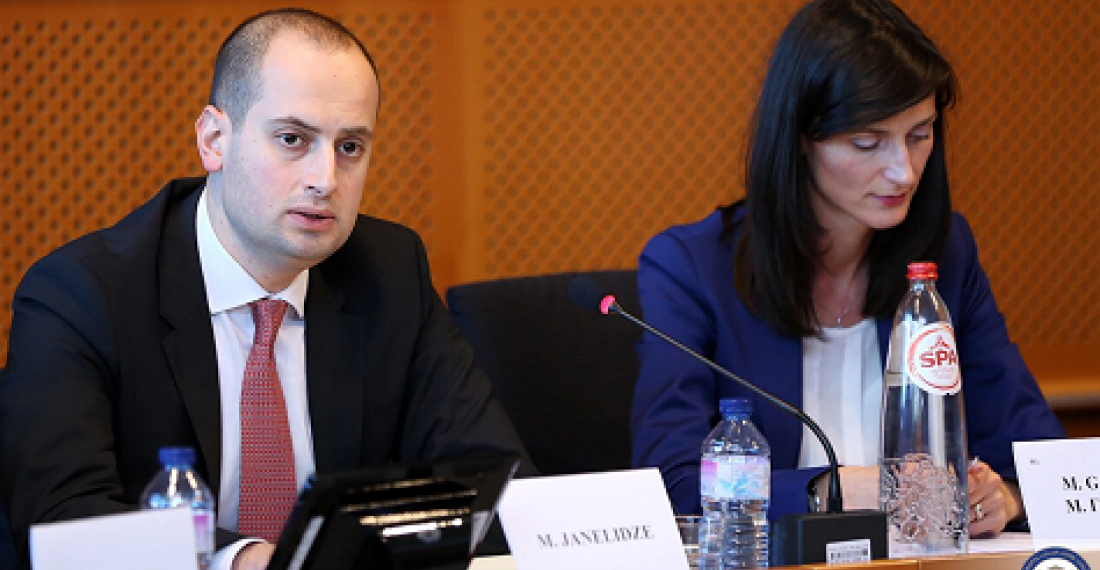The news that a decision to extend visa free travel for tourists and business visitors from Georgia to EU Schengen countries has been once more postponed has been received with dismay both by Georgians, as well as by those who care about the future relations of the European Union with the Eastern Partnership countries
Several years ago Georgia was told that it had to fulfil a set of tough criteria before visa liberalisation could happen. The Georgians embarked with enthusiasm, and diligently, on a programme of reforms, which included substantial legislative changes, changes in the work practices of various government departments and institutions and increased accountability and transparency. Earlier this year EU leaders lined up to congratulate Georgia on what it had achieved and to promise that visa liberalisation was imminent. That was before the summer. Then it was announced that the liberalisation procedure had to be delayed till later in the year. Now another delay has been announced. The issue will come in front of the European parliament in January, and reports suggest that it might not happen before next summer.
All EU officials who have spoken on the matter have said that Georgia has fulfilled all the criteria. There was nothing else they needed to do on this particular issue. The ball is clearly therefore in the EU court.
Speaking to MEPs in Brussels on Wednesday, Georgia's Foreign Minister Mikheil Janelidze was justifiably frustrated. "We have a full understanding of difficulties that the EU is facing today from increased migration to the rise of populism and extremist ideologies. However we should also look at the costs of unnecessary and unjustified delays in making decisions to honour mutual commitments," he said.
He added that helping euro-sceptic sentiments in a "devoted and committed partner like Georgia" would hardly help the EU to overcome pessimism within its citizens.
"It's not surprising that after many years of demanding reforms and the acknowledged progress, the legitimate expectations are very high in Georgia. It carries a tremendous symbolic, political and practical importance for us and serves as a strong message of the EU's political support," Janelidze said.
Janelidze's statement came one day after the European Parliament published its preliminary timetable, showing the consideration of the mechanism for suspension of visa-free regime would begin in the middle of January 2017. Earlier it was believed this would happen before Christmas. Georgia's visa waiver to the Schengen Zone cannot be implemented before the suspension mechanism is agreed.
In his speech, Janelidze focused on the progress Georgia had achieved in the last three years in all areas covered by the Visa Liberalisation Action Plan. He said Georgia had created many economic opportunities by implementing the Deep and Comprehensive Free Trade Area deal, which was part of the Georgia-EU Association Agreement. However, this [DCFTA] agreement will not work to its full capacity if Georgia's businessmen, small farmers or entrepreneurs are not able to attend trade fairs, meet European business partners and explore business opportunities in European markets," he said.
The Georgian Minister stressed a visa-free travel regime between Georgia and the EU would not result in additional migration but fostered better people-to-people contacts, and strengthened cultural and business ties and partnerships.
Instead of embracing all the benefits [the AA deal offers], we see a protracted process of discussions within the EU. We have faced delays associated with EU's and EU member states' internal or external policy issues," he added. However we are also being held hostage of inter-institutional debates, which hardly reflects the spirit of good partnership. Let's not frustrate our people, let's keep them motivated to pursue these demanding reforms and let's continue jointly moving to Europe free, safe and at peace. Let's not benefit those who want Europe to fail," Janelidze said.
Representatives of the European Parliament, European Commission and European External Action Service attended the conference, which was held at the initiative of European Parliament Rapporteur on visa liberalisation for Georgia Mariya Gabriel.
Commonspace.eu political editor said in a comment that what is at stake here is the very credibility of the European Union as an institution in a sensitive part of the Union's neighbourhood. The EU risks discrediting itself unless it moves to bring this issue to a quick solution. The delays may seem justified and reasonable from the perspective of different stakeholders in Brussels, but in Georgia, and in the wider region, they are seen as unnecessary procrastination. Urgent action is necessary before more harm is done, and the political leadership of the EU needs to rise to the occasion, on a matter which is in their competence, and in their ability, to resolve.
source: commonspace.eu with agenda.ge
photo: Georgia’s Foreign Minister Mikheil Janelidze and European Parliament Rapporteur on visa liberalisation for Georgia Mariya Gabriel at a conference at the European parliament in Brussels on 30 November 2016 (picture courtesy of the Ministry of Foreign Affairs of Georgia






